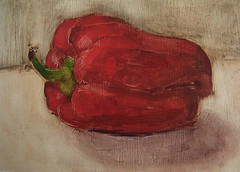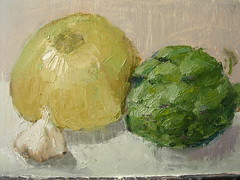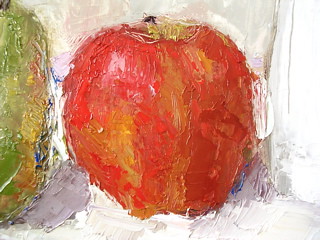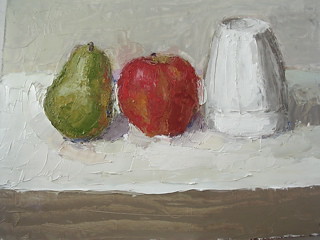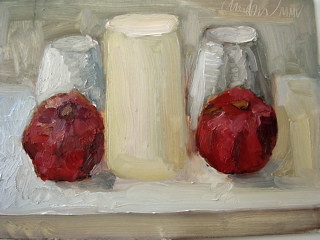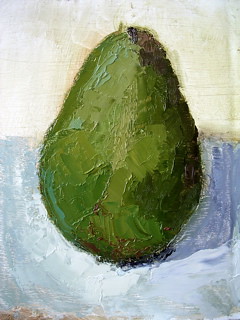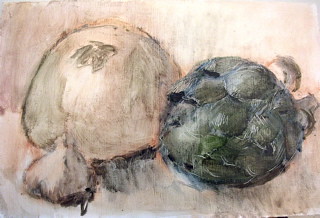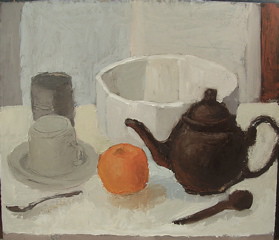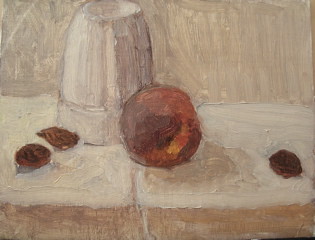By "present situation" of course I mean the present situation of contemporary art. My guess is not many of us spend a great deal of time--if any--contemplating what is going on with art these days (to those of you who take exception to this, it only means that I did not know you were reading my 'blog). This is because contemporary art, like contemporary academia, is opaque to the layman and what is opaque usually becomes ignored. But saying that contemporary art is a rarified field was not the moment of clarity.
The moment of clarity came to me while glancing through Jim Lewis' commentary on the artist Mike Kelley. Kelley's work finds itself in the company of a slew of other artists who make art out the detritus of modern life. I suppose that because this has been ratified as a legitimate mode of artistic production since at least Picasso and Duchamp, Lewis is justified in awarding Kelley the moniker of "the last great 20th-century artist."
But when you look at Kelley's work you realize how bland and cynical the art world is today. And if Kelley is indeed the "last, great 20th-century artist," then the 20th-century was not about art's redefinition or expanding that definition but about art's self-immolation.
I would hate to say this and be labelled as an unreflective, out-of-touch philistine, one clearly outside the coterie of the art establishment (which I may be anyway, but no matter), because to say that contemporary art is bland and cynical or that it has sought the destruction of its ownself in terms of itself is not really to attack contemporary art, but to understand it in the way it wants to be understood. Blandness and cynicism are taken up by contemporary art as an apparatus, or better still, as weapons, by which it does not produce images but rather it attacks or critiques a culture in which image prodcution has been democratized to every quarter or life.
Since the artist no longer has a monopoly on the creation of images, the artist chooses instead to become a philosopher or a critic. In doing so, the artist only builds a bulwark between him or herself and the larger audience. By retreating back to where popular culture cannot follow, the artist ensures that popular culture remains an entity to be critiqued by forcing it to remain intellectually and spiritually inert. Art and artist become anti-art and anti-artist while our culture becomes more and more kitschy, cheap and self-gratifying. In this regard, if we understand contemporary art as a cultural critique, we must also view it as a failed critique because its purpose is not to transform culture but to sustain the division between art/anti-art and non-art.
Art and culture will only be able to move foward when we abandon the historical terms in which art has been situated, when there can be no more last, great artists, only artists. In such an event, it may seem curiously like moving backwards, but only to the artists.
30 November 2005
28 November 2005
Fra Angelico at the Metropolitan Museum of Art

For those of you in the New York-area you may consider going to see what looks like a fabulous exhibition. The rest of us will have to be content with this slide show at Slate.
O Come, Desired of Nations, Come
But about that day or hour no one knows, neither the angels in heaven, nor the Son, but only the Father. Beware, keep alert; for you do not know when the time will come. It is like a man going on a journey, when he leaves home and puts his slaves in charge, each with his work, and commands the doorkeeper to be on the watch.
Therefore, keep awake-- for you do not know when the master of the house will come, in the evening, or at midnight, or at cockcrow, or at dawn, or else he may find you asleep when he comes suddenly. And what I say to you I say to all: Keep awake.
Mark 13
Yesterday was the first Sunday in Advent and thus we begin readying ourselves for the Nativity of Our Lord. I am well underway in my preparations. I have my Christmas blend coffee from Starbucks. I have downloaded some more Christmas music from iTunes and organized a playlist. So as you can see, except for putting up a few decorations, there is really not much left to do.
But Advent is also the beginning of the Church year. Thus, it is not only a time of preparation and waiting and watchfulness--the posture that the Gospel of Mark urges us to--but it is a time for a fresh start. In this regard, I like to think if Advent as a little Lent right before Christmas. (The attitude of fasting and repentence seems to have been lost from contemporary celebrations of Advent. I even just read that some churches are trading Advent purple for blue to distinguish it from Lent.)
In expectation of the coming Lord, what do we need to do to celebrate his Incarnation with due reverence and solemn joy?
Therefore, keep awake-- for you do not know when the master of the house will come, in the evening, or at midnight, or at cockcrow, or at dawn, or else he may find you asleep when he comes suddenly. And what I say to you I say to all: Keep awake.
Mark 13
Yesterday was the first Sunday in Advent and thus we begin readying ourselves for the Nativity of Our Lord. I am well underway in my preparations. I have my Christmas blend coffee from Starbucks. I have downloaded some more Christmas music from iTunes and organized a playlist. So as you can see, except for putting up a few decorations, there is really not much left to do.
But Advent is also the beginning of the Church year. Thus, it is not only a time of preparation and waiting and watchfulness--the posture that the Gospel of Mark urges us to--but it is a time for a fresh start. In this regard, I like to think if Advent as a little Lent right before Christmas. (The attitude of fasting and repentence seems to have been lost from contemporary celebrations of Advent. I even just read that some churches are trading Advent purple for blue to distinguish it from Lent.)
In expectation of the coming Lord, what do we need to do to celebrate his Incarnation with due reverence and solemn joy?
25 November 2005
Huh?
Apparently, certain Canadians--the former Minister of Defense in particular--are concerned that the US is going to start an intergalactic war with a military installation on the moon.
Paul Hellyer, Canada’s Defence Minister from 1963-67 under Nobel Peace Prize Laureate Prime Minister Lester Pearson, publicly stated: "UFOs, are as real as the airplanes that fly over your head."
Mr. Hellyer went on to say, "I'm so concerned about what the consequences might be of starting an intergalactic war, that I just think I had to say something."
Read it here. Thanks to No Pasaran.
Paul Hellyer, Canada’s Defence Minister from 1963-67 under Nobel Peace Prize Laureate Prime Minister Lester Pearson, publicly stated: "UFOs, are as real as the airplanes that fly over your head."
Mr. Hellyer went on to say, "I'm so concerned about what the consequences might be of starting an intergalactic war, that I just think I had to say something."
Read it here. Thanks to No Pasaran.
Why you should go see Pride & Prejudice (despite its deficiencies)

My family decided to take a break today from lazing by the fire and nibbling on leftover bits of turkey and casserole to see the latest revival of the Jane Austen-revival, Pride & Prejudice, starring the ever-winsome Keira Knightley.
This movie is great. Let me get that out of the way before I launch into my relatively minor nit-pickings. Miss Knightley and cast perform admirably their roles in a movie genre which is really the chamber music of the film world. But perhaps the greatest role in the movie is performed by the sets and scenes. Those are, in my opinion, the funnest parts of these movies to give glimpses of the interior and exterior of a world entirely unknown to the majority of us Americans.
The only real problem with this new movie is that it is too short. The two-hour running time is entirely insufficient to draw out all the subtleties of character and plot. We hardly have time to develop a strong dislike of Mr. Darcy before we are asked to like him very much. And the excressable Mr. Wickham is on screem enough to only be entirely indifferent. Alas, the sublime irony of Mr. Bennet is mostly alluded to by his acrot Donald Sutherland rather than made manifest in his portrayal. Perhaps I am merely spoiled by the BBC version of P&P which at around six hours is able to reproduce every last bit of the novel in majestic (or painful) detail.
To return to its good points, however, it would be remiss of me not to comment on the cinematoraphy, which is both intimate and epic at alternating and appropriate points.
Because there won't be much else worth rushing to at the cinema this holiday season, I heartily recommend this gem. But it is by no means a classic. And I think the Holy Father would entirely approve.
24 November 2005
Come, ye thankful people, come

Come, ye thankful people, come, raise the song of harvest home;
All is safely gathered in, ere the winter storms begin.
God our Maker doth provide for our wants to be supplied;
Come to God’s own temple, come, raise the song of harvest home.
All the world is God’s own field, fruit unto His praise to yield;
Wheat and tares together sown unto joy or sorrow grown.
First the blade and then the ear, then the full corn shall appear;
Lord of harvest, grant that we wholesome grain and pure may be.
For the Lord our God shall come, and shall take His harvest home;
From His field shall in that day all offenses purge away,
Giving angels charge at last in the fire the tares to cast;
But the fruitful ears to store in His garner evermore.
Even so, Lord, quickly come, bring Thy final harvest home;
Gather Thou Thy people in, free from sorrow, free from sin,
There, forever purified, in Thy garner to abide;
Come, with all Thine angels come, raise the glorious harvest home.
This is one of my favorite Thanksgiving hymns, which I remember singing in middle school. It was written by Henry Alford in 1844. Happy Thanksgiving, all.
23 November 2005
If Benedict XVI Doesn't Want You to See 'Harry Potter' Should You See It Anyway?

Last night I went to go see the new Harry Potter movie, 'Harry Potter and the Goblet of Fire.' Generally being ">praised by critics, it has obviously been released just in time for the holiday movie-going frenzy. I saw it last night in a virtually empty theater (it was Tuesday night at 9:30) and I must say, bregrudgingly, I enjoyed it. Or not begrudgingly. I did pay money to see it, after all. At over 2-and-a-half hours long, it moves franticly through the plot to condense 450 pages or so of text into one movie. The plot, of course, centers around Harry and friends' bildungsroman as the learn to become powerful wizards and witches. From the opening scene where a snake slithers out of a pile of human skulls, to the ending scene where one boy dies, this movie isBut should we as Christians be concerned about Harry Potter?
My friend MM was discussing this matter with me in regards to his Holiness. Benedict Our Pope has been thoroughly acknowledged this summer for his praise of a book which condemned JK Rowling's series for damaging the developing moral sense in children by obscuring the line between good and evil. As someone who has read all six of the published books and seen all four of the movies, I am hard-pressed to disagree.
It reminds me though of a conversation I had as a much younger version of myself about the Disney movie The Lion King. I had just seen it with some schoolmates and returning from the theater with the mother of some of these same, we were engaged in a conversation over the alleged presence of "New Age" ideas in the movie. My friends, which were at that time, and I assume still are, ardent protestants, lambasted the movie along these grounds. I, who had enjoyed the movie thoroughly, remained silent, until unable to keep quiet any longer said, "It's just a movie!" Meaning, that the movie was meant to be enjoyed and these philistines had failed to appreciate this. The mother of some of the philistines was in the drivers seat and called over her shoulder to me that a movie is never just a movie but that it is laden with (and here I am paraphrasing) ideological content. If by saying that she meant me to dislike her intensely, she succeeded.
It, is, of course, an old debate. What is the role of art in the Church, and what is a Christian response to art? It is a debate that has raged at least since St. Bernard of Clairvaux attacked the excess of the Benedictine order. The role of the arts are more undefined than ever in the Church. We like to let the secular culture take care of our entertainment and aesthetic diversions. This of course, extends to the upcoming movie adaptation of The Lion, the Witch, and the Wardrobe.
This blog entry has gotten sidetracked. I'll have to pick up all the threads in the future. But we are definitely on to something here.
21 November 2005
A New Liturgy
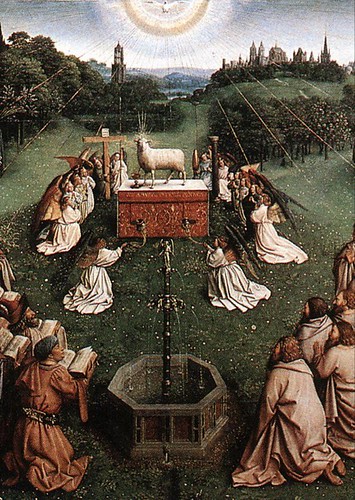
A couple of posts over at Pontifications, one by Al Kimel titled Re-enchanting the Mass and another by Anthony Esolen called On the Proposed Changes to the Roman Missal have given me a lot of hope for the Catholic Church. Supposedly, there is a new translation of the Latin rite in the works which will bring the language of the liturgy more in keeping with the Latin by making the translation more literal rather than "dynamically equivalent." With the jettisoning of dynamic equivalence we will be able to say things like "And with your spirit" rather than the tepid "And also with you." These changes will make it much more like the Rite I liturgy practiced by the Anglican-Episcopal Church in the Book of Common Prayer, which in my opinion, is among the most beautiful of all liturgical expressions. With this change, whenever it comes, I will rejoice greatly, as I deeply regret losing contact with the Rite I when I cross the Tiber.
Equally interesting though is the argument that is being made that the new translation of the rite will bring about more devout responses from the laity, since by taking out the everyday language, the mass will be taken out of an everyday experience and become more deliberate, and hopefully, more pious. The comparison has also been made to the way poetry functions, that it does so by attenuating language making it special, even opaque so that it means more than what it says, so that how it means is as important as what it means.
What it suggests of course is that the content--worship--cannot be separated from the means--words, music, gesture, just like you can't separate water from a water baloon or from a glass and still have a joke and a drink. You have a puddle, which means something else again. Instead forms are being stripped away and nothing is left because the meaning needs the form for it to exist. It becomes incarnate in the form.
It's a heady topic, one that I could only begin to scratch the surface of here. But I am glad to know that changes are afoot. I only want to know when will the new liturgy arrive? And when will they stop making us sing those insipid modern hymns?
Why don't Catholics go to confession anymore?
Andrew Santella in an article at Slate asks why have Roman Catholics quit going to confession? I'd be curious to know the answer myself. Santella's answer--that it's just too much work--seems reasonable. But why is it too much work? Why is it that in the earlier part of the last century confession was a regular part of Catholic worship and now people don't deem it to be a vital part of their salvation?
Since I am not yet fully Catholic, confession is not yet a part of my spiritual life. I went to confession once at an Anglo-Catholic church and found the whole thing terribly awkward and uncomfortable--rather like going to the dentist, which I also don't enjoy. But necessary all the same.
I'd be curious to know other people's thoughts on confession.
(Incidentally, my illustration is a detail of Rogier van der Weyden's Seven Sacraments Altarpiece, 1445-50)
17 November 2005
Today's Fortune is...
In case you haven't gotten Chinese take-out this week, here's the contents of my fortune cookie.
16 November 2005
Mind-Bending Illusions
I saw this over at ...Perceptions... and then tracked down the original site. These are some crazy, crazy optical (or "visual," more properly) illusions.
14 November 2005
Theology of the Body
My friend MM has started her own 'blog called Theology of the Body. She has promised to use her virtual internet forum as a medium to bring into the Church. Well done, I say. Her title is intriguing. One wonders if she'll use it to address postmodern ideologies regarding the body as a locus of power relationships.
New Music
I discovered a new musician this past week--Abigail Washburn. She plays the banjo and her music is sort of Alison Krauss/Appalachian Mountain music meets Chinese folk music. It's pretty enjoyable over all. You can listen to her interview via Podcast from her site or from iTunes, where, of course, you can also buy her album. It's called Song of the Traveling Daughter.
The lyrics are charged with a lot of biblical imagery, but I don't know if that is the residue of the genre she is working in or the result of true belief. She espouses what she calls the New Feminism and deliberately courts ambiguity in her songs/interviews. Let me know what y'all think.
The lyrics are charged with a lot of biblical imagery, but I don't know if that is the residue of the genre she is working in or the result of true belief. She espouses what she calls the New Feminism and deliberately courts ambiguity in her songs/interviews. Let me know what y'all think.
Recent Paintings
Here is the finished painting from the one below. I am not entirely sure it was made better by continuing to paint on it.
08 November 2005
07 November 2005
Some recent paintings of my own making
This is a work in progress--underpainting, I suppose. Very recently I have discovered what a huge difference good gesso makes. I've been using Gamblin Oil Painting Ground and so far, can't recommend it enough.
05 November 2005
A long time between 'blogs
It has been too long, I know, since my last blog entry, as members of my (very) small but (very) avid readership have let me know. I am trying to rectify that fault.
October, however, proved to be a busy month, and I am sure that November will be no different. October centered primarily around preparing a paper on Stuart Davis at the South Eastern College Art Conference (SECAC)'s annual meeting, this year in Little Rock, AR. That giant ball of stress has finally unknotted itself from my stomach allowing now for more urgent balls of stress to tie themselves up in its place.
SECAC, though, held a couple of surprises. No less than two people (out of four) in my session presented papers on issues relating to Catholic art in the 20th century--an issue of particular intrest to me, but one which I have had up until now little opportunity to indulge. I also heard a fascinating paper on the use of relics in extreme circumstances during the building of the Cathedral of St. Denis. All-in-all it was good time, but I am gladder now that it is over.
In other news, my conversion proceeds apace, which is to say that I continue at it still. It has been nearly two months since the process began and sometimes I feel it is moving far too slowly for my tastes. Easter still seems a long way off, but not so far off that I feel like that there is much about Catholicism which is not expressed--e.g. many points of doctrine and of faith (like the creed) are not really elaborated upon. It occurs to me that this may be remedied after Christmas when we move from the pre-Catecumenate period to the Catecumenate period.
My experiene with Catholicism so far has led me to the conclusion that many of the "cradle Catholics" I have met are extremely uninformed about what they believe. I find this to be, well, distressing. Protestantism--aside from what I feel are its manifold flaws--has at least gone about thoroughly indoctrinating its members to such an extent that they generally are equipped to answer questions about what they believe. Perhaps my understanding of this will change as time goes on and as I move closer to actually entering the RC Church.
October, however, proved to be a busy month, and I am sure that November will be no different. October centered primarily around preparing a paper on Stuart Davis at the South Eastern College Art Conference (SECAC)'s annual meeting, this year in Little Rock, AR. That giant ball of stress has finally unknotted itself from my stomach allowing now for more urgent balls of stress to tie themselves up in its place.
SECAC, though, held a couple of surprises. No less than two people (out of four) in my session presented papers on issues relating to Catholic art in the 20th century--an issue of particular intrest to me, but one which I have had up until now little opportunity to indulge. I also heard a fascinating paper on the use of relics in extreme circumstances during the building of the Cathedral of St. Denis. All-in-all it was good time, but I am gladder now that it is over.
In other news, my conversion proceeds apace, which is to say that I continue at it still. It has been nearly two months since the process began and sometimes I feel it is moving far too slowly for my tastes. Easter still seems a long way off, but not so far off that I feel like that there is much about Catholicism which is not expressed--e.g. many points of doctrine and of faith (like the creed) are not really elaborated upon. It occurs to me that this may be remedied after Christmas when we move from the pre-Catecumenate period to the Catecumenate period.
My experiene with Catholicism so far has led me to the conclusion that many of the "cradle Catholics" I have met are extremely uninformed about what they believe. I find this to be, well, distressing. Protestantism--aside from what I feel are its manifold flaws--has at least gone about thoroughly indoctrinating its members to such an extent that they generally are equipped to answer questions about what they believe. Perhaps my understanding of this will change as time goes on and as I move closer to actually entering the RC Church.
Subscribe to:
Posts (Atom)




